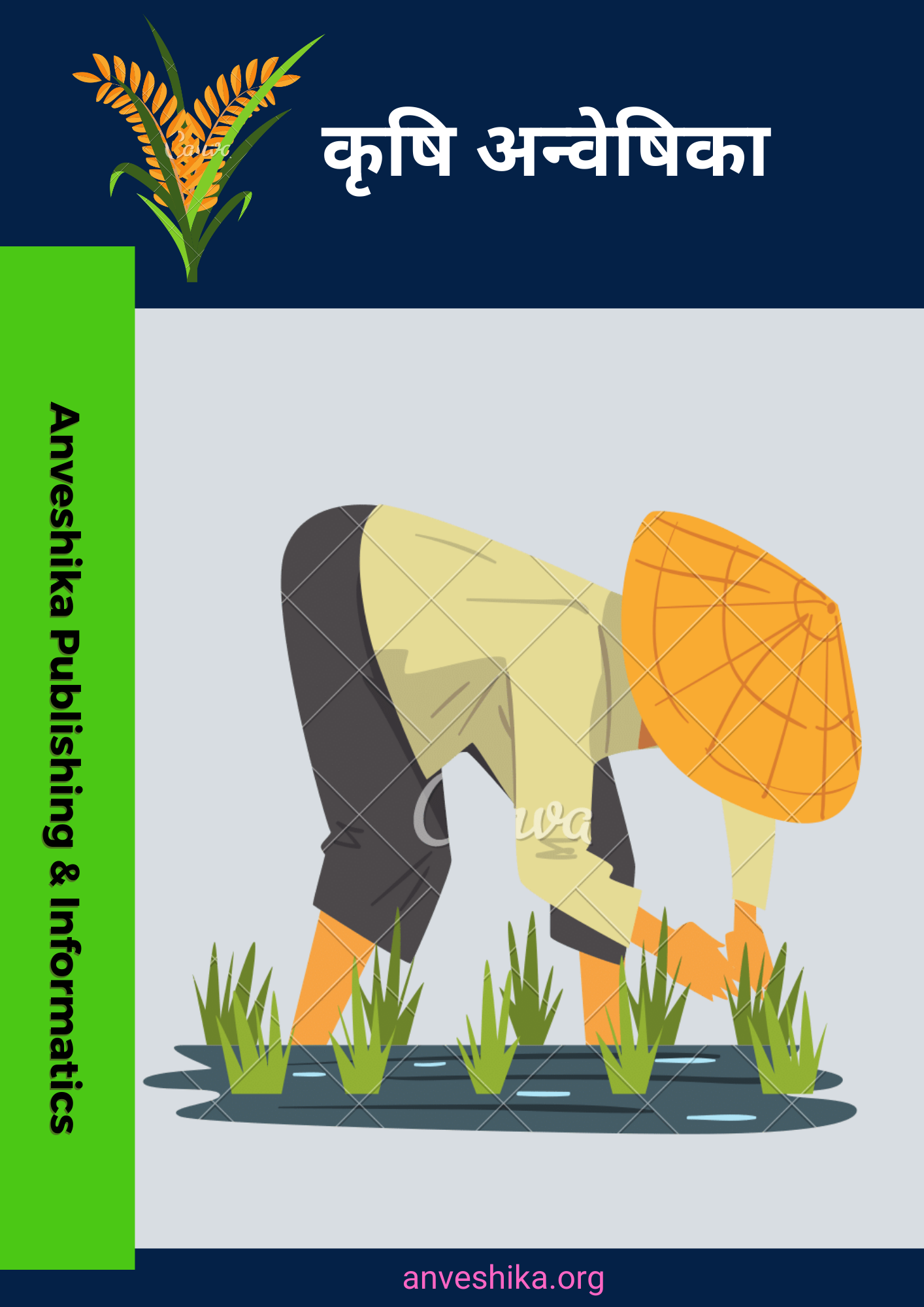| Title : मटर की उन्नतशील खेती |
| Authors : सर्वेश कुमार,नीरज पाल,दीपक कुमार गौतम |
|
|
| Keywords : |
| Download Pdf |
| Title : समन्वित पोषक तत्व प्रबन्धन |
| Authors : सर्वेश कुमार,नीरज पाल,दीपक कुमार गौतम |
|
|
| Keywords : |
| Download Pdf |
| Title : ग्रीष्मकालीन और वर्षाकालीन भिंडी की उन्नतिशील खेती |
| Authors : सर्वेश कुमार,अरुण कुमार पाल |
|
|
| Keywords : |
| Download Pdf |

|

|

|

|
||

|

|
|

|
||

|
||

|
||

|
||
- कृषि अन्वेषिका में प्रकाशन के लिए ऐसे लेख आमंत्रित किए जाते हैं जो कृषि के सभी विषयों में मौलिक अनुसंधान, प्रौद्योगिकी एवं नवीन जानकारियों से सम्बंधित हो, तथा इन लेखों से कृषि जगत से संबंधित सभी व्यक्तियों को लाभ मिले |
- लेख सरल एवं रोचक भाषा में लिखा जाना चाहिए |
- लेख अधिकतम 3000 शब्दों का होना चाहिए|
- लेख कृति देव 010 या शिवा लिपि (font) में होना चाहिए | लेख के साथ अच्छी गुणवत्ता के 2 से 5 रंगीन चित्र भी अवश्य होने चाहिए |
- सभी लेख स्वरचित होने चाहिए | लेखक अपने लेख में दिए गए आंकड़ों एवं तथ्यों से संबंधित पांच श्रोत (references) अवश्य दें |
- संपादक को पूर्ण अधिकार है कि वह उपयुक्त न पाए जाने पर किसी भी लेख को अस्वीकार कर सकता है |
- लेख में सभी लेखकों का पूरा नाम, ईमेल, मोबाइल नंबर एवं उनके संस्थान का पूर्ण विवरण अवश्य लिखा होना चाहिए |
- लेख प्रकाशन शुल्क: ₹ 400
- लेख वेबसाइट पर ऑनलाइन माध्यम से अथवा ईमेल (editorial@anveshika.org) के माध्यम से प्रकाशन के लिए भेजे जा सकते हैं |
- लेखक अन्य किसी जानकारी के लिए मोबाइल नंबर एवं व्हाट्सएप नंबर 7991337001 या ई-मेल editorial@anveshika.org पर संपर्क कर सकते हैं |
Statement of Human and Animal Rights
In the research work where human subjects or material were involved, all authors should clearly declare that entire experiment work was done as per ethical standards of the responsible committee on human experimentation (both institutional and national) and with the Helsinki Declaration of 1975, as revised in 2000 and 2008. In case of animal experiments, authors should clearly reveal that all experimental procedures were done according to institutional and national guidelines for animal care and laboratory use.
Statement of Informed Consent
Patients have a right to privacy that should not be infringed without informed consent. Identifying information, including patients' names, initials, or hospital numbers, should not be published in written descriptions, photographs, and pedigrees unless the information is essential for scientific purposes and the patient (or parent or guardian) provides written informed consent for publication. Authors should also identify individuals who provide writing assistance and disclose the funding source for this assistance. Identifying details should be omitted if they are not essential. Complete anonymity is difficult to achieve; however, informed consent should be obtained if there is any doubt. For example, masking the eye region in photographs of patients is inadequate to ensure anonymity. If identifying characteristics are altered to protect the patient, such as in genetic pedigrees, authors should guarantee that alterations do not distort scientific meaning.
Publication Ethics and Publication Malpractice Statement
Editor’s responsibilities
Editors are responsible for taking the decision to publish a submitted manuscript on the basis of quality, originality, scope and relevance. Editor and editorial staff will maintain the necessary confidentiality of the manuscript and will not use it for any other purpose.
Reviewer’s responsibilities
Reviewers should screen the manuscript for various quality parameters and provide the relevant comments to the editors, which helps them in decision making. Reviewers must carefully check the literature citation, writing quality, experiment setup and scientific relevance of results. A special emphasis will be given on plagiarism checking of manuscript. Reviewers will also maintain the necessary confidentiality of the manuscript and will not use it for any other purpose. Conflicts of interest regarding collaboration with authors of submitted manuscript must be disclosed to the editor, and then excluded from the review process.
Author’s responsibilities
Manuscript submitted to our journal should not be published in any other journal, and also not currently under consideration by another journal. The manuscript must be approved by all the co-authors for their scientific contents and submission for publication in the journal.
Authors should provide the details of their experimental work so that others may replicate the experiments. Authors should prepare their raw data and submit it to editors/reviewers upon request.
Any kind of fraud or unethical practices like Fabrication/ Falsification of Data, Plagiarism, Unacceptable Author Contribution, Citation Manipulation, Concurrent Submissions, and Redundant Publications are totally unacceptable. All authors must give a clear statement that no unethical practices are involved in this research work. All authors have a responsibility to disclose the conflicts of interests and financial support for work, if any.
After publication of the manuscript, if any error is found in research work, the chief-editor should be immediately informed. After deep discussion with the research team, the manuscript will be corrected or even withdrawn.
Literature source for ethical standard
- Committee on Publication Ethics (COPE). Code of Conduct and Best-Practice Guidelines for Journal Editors.
- Graf C, Wager E, Bowman A, Fiack S, Scott-Lichter D, Robinson A. Best Practice Guidelines on Publication Ethics: a publisher's perspective. Int J Clin Pract Suppl. 2007 Jan;61(152):1-26.
- International Committee of Medical Journal Editors. Uniform Requirements for Manuscripts Submitted to Biomedical Journals: Writing and Editing for Biomedical Publication. 2006.
- American Psychological Association. Ethical Principles of Psychologists and Code of Conduct, Section 8 ‘Research and Publication’.
- American Chemical Society. Ethical Guidelines.

